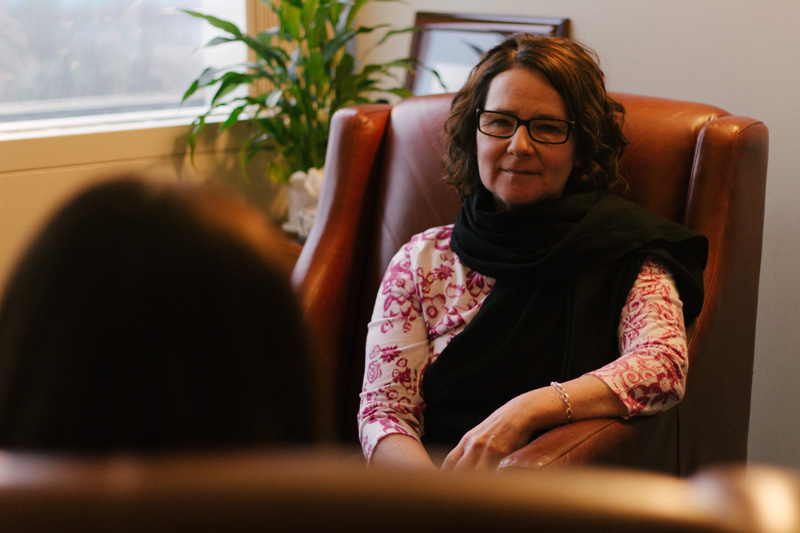Mental health and wellness is a priority for BC First Nations as our communities continue the journey of healing from the painful impacts of colonization and residential schools.

Dr. Heidi Hansen
FNHA Health Benefits provides mental health services through our Short-term Mental Health Crisis Intervention Benefit and the Indian Residential School Resolution Health Support Program. We maintain a list of 349 registered mental health providers across the province. Last year, they provided counselling to over 2,000 BC First Nations community members.
Providing culturally safe mental health care requires an understanding of how our shared history shapes our health and wellness. Our new initiative engages mental health providers working with FNHA clients in Indigenous Cultural Safety Training.
"Our people have always known that health is connected to spiritual wellness. The harmonious balance of healing through traditional and cultural practices was forcibly interrupted by colonialism, government policies and institutions – Indian Act, Residential Schools, Indian hospitals," explains Naomi Williams (Cowichan Nation), FNHA Vancouver Coastal Regional Director. "Now, we are redefining and redesigning health services to include our world view. Part of that work includes making sure that everybody who works with us has a foundation of understanding of that history and joins us in a shared vision moving forward. The Indigenous Cultural Safety Training is a great starting place."
Understanding our stories
"Some of my clients come to me as survivors of Residential Schools. Or sometimes it is their children or grandchildren, or other family members. We know that the effects of the schools are intergenerational," explains Dr. Heidi Hansen (Cree), a FNHA mental health provider and registered social worker.
Sometimes when First Nations clients seek mental health services, there can be a lack of knowledge about colonization and how it impacts mental health. Dr. Hansen explains that this may put clients in the position of having to teach the counselor, who is not fully aware of our shared history, instead of focusing their energy on their own healing work.
"When I share my experience, that my mom was also a residential school survivor, it's almost like there's an exhale," says Dr. Hansen. "There is relief that I understand their history, our history."
Brenna Latimer (Kwakwaka'wakw), FNHA's Team Lead for Corporate Internal Communications, sees sessions with Dr. Hansen as an essential part of her overall wellness plan. "Heidi's understanding of our people's history, including the intergenerational impacts of Residential Schools, made our relationship and sessions more useful from the beginning," she explains. "I didn't have to start from square one."
Cultural safety for healing
Not all mental health providers come to the table with the same personal experience as Dr. Hansen, which is why our updated process requires that all providers registered with FNHA Health Benefits complete Indigenous Cultural Safety (ICS) training.
San'yas Indigenous Cultural Safety Training is an online training program for health providers offered by the Provincial Health Services Authority Aboriginal Health Program. Developed by a First Nations team, the training was created to improve the safety and quality of health services for BC First Nations. One program is designed specifically for mental health professionals. Interactive online modules include videos of Elders and residential school survivors sharing their stories, historical timelines, and space for discussion.
Joan Tuttle is a registered counsellor with the FNHA who has worked with First Nations people throughout her career. She explains that, "the cultural safety training made me reflect on how I could be more open to my clients' cultural traditions in my practice, and support them to draw on these sources of strength."
"It is so important for mental health providers working with us to take this training - it's about helping them to understand the person sitting across from them a little better," says Brenna.
Lifelong learning
Despite their extensive experience working with First Nations clients, Dr. Hansen and Ms. Tuttle both say that taking the ICS training was an invaluable part of lifelong learning about how to be culturally safe mental health providers.
"For me, the training wasn't just an intellectual exercise – it was a personal one," says Ms. Tuttle. "It asked me to look at Canada's history in a way I hadn't been asked to look before. It is really about deepening one's ability to work with Indigenous people in a respectful way."
Each participant is asked to reflect on the biases, history, identity and beliefs that they bring to the table. Through this process of cultural humility, therapists can work to create safer spaces for healing.
"Cultural safety is about creating a space for First Nation clients, where they feel safe, respected and not judged," says Dr. Hansen. "The ICS training gives mental health service providers a chance to learn about our history, but also to learn something about themselves that they didn't know before…to be more aware about what they bring to their practice and the people they're working with."
So far, 202 of the 349 mental health providers serving FNHA clients have completed the Indigenous Cultural Safety training. All new and existing providers who offer services to FNHA clients are required to take the training, within a one-year time period, as part of our commitment to high quality mental health services for BC First Nations.
To access FNHA Health Benefits' mental health services, community members can call our toll free number for information about registered providers in their area.
Short-term Mental Health Crisis Intervention Benefit: 1-800-317-7878
Indian Residential School Resolution Health Support Program: 1-877-477-0775
If you're a provider interested in providing mental health care through our program, take a look at our Guide to Mental Health Counselling Services guide online.

